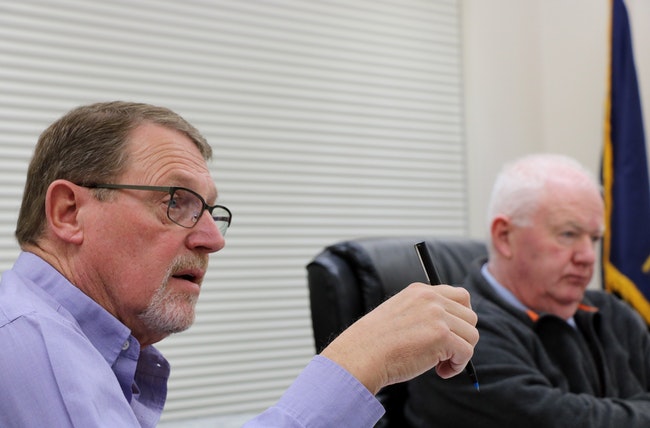
Larry Wilson, Malheur County Commissioner, at the courthouse on Wednesday, Dec. 11. (The Enterprise/Joe Siess)
VALE – The Malheur County Court has voted unanimously to spend nearly $1 million toward the purchase of 290 acres of private land north of Nyssa to make way for a proposed rail reload center and an adjacent industrial park.
The court action came after a standing room only public meeting at the courthouse on Dec. 30 where half a dozen local residents voiced concern or opposition to the county’s proposed industrial development including a rail shipping center.
WATCH RESIDENTS GIVE PUBLIC COMMENTS
The session was extraordinary because the purpose was a public hearing on a change in the county budget, a mundane task typically done with little citizen interest.
County Commissioner Larry Wilson used the occasion to address mounting questions about the county’s plan to build an industrial park adjacent to the Treasure Valley Reload Center. Wilson professed mystery at reports that the county needed $14 million to build out the park and said state officials had changed their minds about what development to support in Malheur County.
WATCH COMMISSIONERS DELIBERATE
With the $1 million in hand, the county is expected this week to close its $3 million deal for the 290 acres of farmland in Nyssa. An independent appraisal has valued the acreage at $1 million less than the $3 million the county has agreed to pay.
[ KEEP YOUR LOCAL NEWS STRONG – SUBSCRIBE ]
The property is owned by the Farmers, including Jim Farmer, president of Fort Boise Produce, an Idaho-based packing firm. The county agreed to the deal while Jim Farmer sat on the Malheur County Development Corp., the public company set up by the county to run the reload project. He resigned that board earlier last year.
Before the court voted to earmark the money for the land, local residents spoke out, with some calling for the county to slow down and reconsider its plans.
“The land you are purchasing, I am opposed to that lot for the simple reason the elevation between the main track and the land is unsuitable and it is a lot of money to make that land available for the railroad,” said Nyssa farmer Dirk DeBoer.
DeBoer said he didn’t understand why the court was ready to buy the Farmer property.
“I just don’t see the numbers to make this work. What kind of deal is this?” DeBoer asked.
Vale resident Jennifer Applegate said she opposed the land deal because of a “lack of candor, honesty and competence, based on what I can research and find out. I oppose this project move.”
Vale resident Joe Mendiola asked how much taxpayer money the county commissioners were willing to spend on the project.
“And how will it benefit the average person in Malheur County. I don’t understand that,” he said.
Mendiola also asked the court if it had addressed the fact that Union Pacific “says they don’t have enough cars to facilitate this project.”
“That was brought up early on. Union Pacific said they don’t have enough cars to make it work so where are you going to get those? So that’s why I am opposed to it. I think the only way you’re going to benefit the people, the average people in Malheur County, is to take the $43 million you’re going to spend and send us all a check,” said Mendiola.
County resident Roger Corrigall said he opposed the rail reload center because “we’re stealing from Adam to pay Paul,” referring to a state loan the county is taking to finance the real estate.
“We do not know exactly, well we don’t know for sure if all of the expenses are going to be covered by the state and is this going to come around and bite us in the back again?” he asked.
Kathy Clarich said that while the rail reload center could be a good thing for the county, she felt the land purchase was “speculation.” She wondered why all of the 290 acres of the Farmer property was needed.
The county has identified 65 acres needed for the rail center, now projected to operate in 2022.
“I don’t know why we can’t go back and renegotiate with them for just the purchase of that ground for the railroad reload site. I think the rest of speculation is going to cost the taxpayers. I just don’t think our county government should be in the speculation business,” said Clarich.
Vale resident George Clerup said the project should be put up for a vote.
“I think that we’ll see what everybody thinks because we are all going to have money in this thing. I oppose it. I just don’t think it was quite planned right,” said Clerup.
Michael Amick said initially he supported the rail reload facility.
“It looks great, it’s going to be paid by the state, can’t get any better. But then we start getting all these problems, find out it costs more money, a lot more money. There’s a big black hole here and how much are we going to dump into it?” said Amick.
Area farmer Doug Maag spoke in favor of the rail reload project.
“I see this as a potential, very positive, in moving our product out of this area to where our customers are at. I pay a fair amount of taxes in this community and sometimes we have to spend money to make money,” said Maag.
Nyssa-area farmer Mike Walker also spoke in favor of the rail project but with limitations.
“Really the commissioners have no choice but to move ahead. It is critical that long-range plans to facilitate jobs and economic opportunities be supported by infrastructure development, such as the Treasure Valley Reload Center and industrial park,” said Walker.
Walker, though, criticized the court regarding the planned land purchases.
“It’s very clear that this initial land acquisition, the very first step of the project, was not well done and resulted in significant cost overruns from the county,” said Walker.
Walker also asked why Farmer was allowed to remain on the development company board while negotiations were underway to buy his land.
“This must be a new low point in corporate governance. Certainly Mr. Farmer would have been privy to the board’s siting discussions and strategies,” said Walker.
Walker, though, urged people think long-term on the rail reload facility.
“Boise is growing, it’s growing very rapidly. Some of that growth is going to come across the river. Let’s take advantage of it,” he said.
In a letter to the court, Ontario resident Sarah Ray asked a series of questions – including what was the number of businesses expected to locate at the industrial park and what would be the estimated tax revenue.
County resident Tom Butler in his letter to the court asked the commissioners to “disclose to the public what the total anticipated cost of this project may be (beyond the total financial investment which is being committed by Oregon Department of Transportation).”
He said that “there is great expectation by some that ‘if we build it, they will come’ but my concern is that there always needs to be alternative plans for repayment of amounts presently being committed from the county general fund property tax revenues.”
After a recess, Wilson attempted to answer the public’s questions.
He has been the county court’s liaison to the project.
Wilson said that word that Union Pacific wouldn’t provide the specialized cars needed to ship onions was “sprung on us later.”
Email documents show, however, that railroad officials warned the Malheur County Economic Development Department last January that it wouldn’t provide the cars.
The county a month later told state officials that Union Pacific was investing in new rail cars, suggesting there was no rail car issue. Railroad officials testified last February, however, it didn’t have the needed rail cars and customers would have to provide them.
Wilson said last week “negotiations with a potential operator of the reload facility include the issue of providing rail cars.”
The county is negotiating with AmeriCold, a national shipping and warehousing company with operations in Ontario.
One of its employees sat on the local development company board until last fall.
“Whoever we select will have to help us out on the cars,” said Wilson.
Wilson spent time addressing reports by the Malheur Enterprise that state records showed the county needed $14 million to build out its industrial park.
“I don’t know where the newspaper came up with that $14 million figure,” he said.
The figure came from the county’s application to the state to be considered for a program that rebates income tax receipts from new employees at the industrial park. Wilson was provided the number in written questions before the Enterprise’s story published.
Wilson said that the $14 million in project expenses listed by the county would come out of the $26 million grant from the state to build the reload center.
“Everything in there had to be for that, estimated out of that $26 million,” Wilson said.
The county’s application, however, listed expenses that would be for “the proposed development surrounding the reload center project” and would be for “additional site development” beyond the $26 million being invested in the reload center.
Wilson said the county would not borrow the $14 million, but rather would get that from the income tax rebates. The state program, however, reimburses local governments for expenses in undertaking industrial development and only after new jobs and wages are created.
He said the county listed the additional development costs at the state’s urging.
“They told us in our application to break it down. You have to come up with every possible use of those funds,” said Wilson.
Wilson, Joyce and County Commissioner Don Hodge have not addressed questions from the Enterprise the past two months about the source of money for the county’s industrial park development. Wilson by Monday hadn’t answered written questions seeking clarification of his public remarks last week.
Wilson also addressed why the county had to put up money to buy the Farmer property. The county also is considering buying another Nyssa parcel owned by a company in which Wilson has said he has a small stake.
“Most of us felt like that, initially, that that property would be able to be purchased with that $26 million,” Wilson said. “That changed and changed a couple of times.”
Wilson said that “a lot of people have questioned us, that we are hiding, initially that property was to be purchased with that $26 million.”
Documents acquired by the Enterprise, though, show in February the state directly told county officials that the state money could only be used for the land needed for the reload center. The money was not for industrial parks, the state said.
Malheur County officials continued planning on state money for the entire Farmer property and a second industrial park, listing $3.2 million in state money as recently as last August. That was half a year after the county was alerted about limitations on the state money.
Hodge told the hearing that while it may take a while, the project will pay off for the county.
Joyce said that initial milestones required by the state on the project had been met and that the real story “is the goal posts have been moved a lot of times in this project and we’ve had to adjust ourselves.”
PREVIOUS REPORTING:
Malheur County OKs $1 million to seal land deal as citizens have their say
‘Just be honest’ – respondents want Malheur County Court to be more open with development details
Public wants vote before Malheur County commits millions, survey shows
Malheur County Court hears that county will make back any industrial investment
Malheur County needs another $14 million to build Nyssa industrial park, records show
How the Enterprise produced its story on county land deal, finances
Malheur County leaders mum as appraisal shows land value $1 million less than they agreed to pay
County taxpayers to be tapped nearly $1 million to buy Nyssa property, state reports
Malheur County plans borrowing to buy up private industrial land for future projects
For the latest news, follow the Enterprise on Facebook and Twitter.
Reporter Pat Caldwell: [email protected] or 541-473-3377.
For the latest news, follow the Enterprise on Facebook and Twitter.
SUBSCRIBE TO HELP PRODUCE VITAL REPORTING — For $5 a month, you get breaking news alerts, emailed newsletters and around-the-clock access to our stories. We depend on subscribers to pay for in-depth, accurate news produced by a professional and highly trained staff. Help us grow and get better with your subscription. Sign up HERE.




